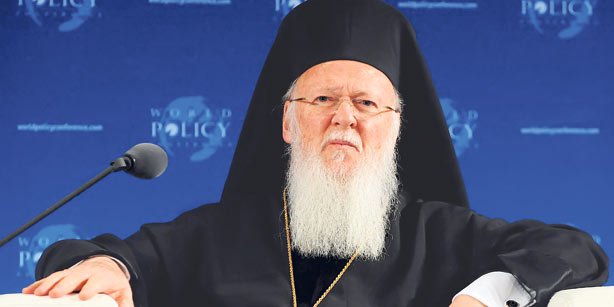
Greek Orthodox Patriarch Bartholomew I will present a package of proposals to Parliament next week, emphasizing the restricted rights of minorities in Turkey and demanding they play a role in top-level state bureaucracy.
Patriarch Bartholomew will speak in front of MPs in Parliament on Feb. 20, when he will discuss the problems facing minorities living in Turkey in the context of a new constitution, Milliyet daily reported on Tuesday. He will also argue that people in influential positions of authority, such as judges and prosecutors, should be more accessible to non-Muslim minorities, who are currently not represented in the state bureaucracy, despite there being no restrictions on their ability to hold these offices in the current constitution.
Patriarch Bartholomew wanted to address Parliament at the end of February, as he said he has a busy schedule until February 15. Nevertheless, the patriarch is set to address Parliament on Monday February 20, as he wants to discuss non-Muslim's views on the new constitution with members of parliament in person. Civil society organizations, associations, foundations and the Minority Communities Sub-Commission established under the parliamentary Constitutional Commission will come together with the Orthodox leader in Parliament. Following Bartholomew, the Commission will listen to the views of representatives of other minorities living in Turkey, including Jewish and Assyrian communities.
Non-Muslim groups, including Greek, Armenian, Jewish and Assyrian communities have prepared proposals for the new constitution.
Educational problems are highlighted in the package of proposals expected to be presented by Patriarch Bartholomew. According to the Lausanne Treaty signed in 1923, the state is obliged to provide educational services to non-Muslim communities that equal those Muslim communities receive. The proposals state that educational services were partially provided to non-Muslim communities until 1974. Since then, communities have been unable to educate religious leaders due to the lack of support.
Non-Muslim communities want religious schools to be opened, according to the proposals, a move which will undoubtedly eliminate these problems. During the meeting, the patriarch will request support for non-Muslim schools and demand the opening of theological colleges in Turkey.
Patriarch Bartholomew is expected to request the removal of expressions that are likely to provoke hate crimes, such as Armenians and Greeks “stabbed Turks in the back,” from school textbooks. He will also suggest diverting a share of the Religious Affairs Directorate budget to non-Muslim minority communities. The proposals being presented by Patriarch Bartholomew state that the stigmatization of minorities on television leads to hate crimes, such as the murder of Hrant Dink, an Armenian-Turkish journalist, who was shot dead outside his newspaper’s office in Şişli, İstanbul on Jan. 19, 2007. The package demands that action must be taken taken on bringing hate speeches and hate crimes to an end.
In the package the restricted role of minorities in the public sector is particularly highlighted, as minorities are limited from assuming influential positions such as judges and prosecutors, even though the current constitution imposes no such restrictions. The package of proposals asks that the way to the top-level bureaucracy be opened. The package reports that, like imams, priests and rabbis should be paid by the state through funding from the Religious Affairs Directorate. “All communities [in Turkey] should be given legal recognition. Meanwhile, they should be able to have assets, change their endowment documents and access assistance from EU funds.
Turkey’s EU chief negotiator to minorities: Nobody can harm our sense of unity
Addressing representatives of the different minority groups at the fifth meeting of Dialogue with Civil Society, organized by the Turkish EU Ministry, in İstanbul on Tuesday, EU chief negotiator Egemen Bağış said nobody can damage the social union in Turkey. Speaking at the opening ceremony of the meeting, which was held at the Marmara Hotel in Taksim, Bağış noted that the common bonds between the various communities in Turkey is stronger than the differences and that social cohesion and harmony was cemented in the country more than ever. He underlined that the history of this country envisages a common future and trajectory for all communities in the region. Referring to events in the past that targeted minorities, Bağış assured the representatives of the communities that such incidents will not take place in today’s Turkey.
